If you’re considering living in an RV during the winter, you probably have a lot of questions. Is it even possible? What do I need to do to make sure my RV can withstand the cold? How will I survive without all of my regular amenities? In this article, we will answer all of your most common questions about living in an RV during the winter. We’ll talk about what to expect, what you need to do to prepare, and how to make the experience as comfortable as possible. So read on for all the information you need to know!
Table of Contents
Benefits of RV winter traveling
If you do not have your own camper, but there is a great desire to go on a trip in winter, it is not a problem to rent it. In addition, the cost of rent will be much lower than in summer, which means that the trip will be cheaper. Companies that specialize in providing such services offer motorhomes already fully equipped for long trips with everything you need, from spare batteries to kitchen utensils. Therefore, in addition, you will need to purchase only a variety of little things that will be useful on the road.
Another advantage of such trips is the absence of the need to book a hotel room. On the eve of a long weekend during the holidays, this may be a problem due to the large influx of tourists. But if you have a camper, you can stop anywhere and spend time in the most picturesque corners and popular places for your own pleasure, without worrying that accommodation will cost too much.
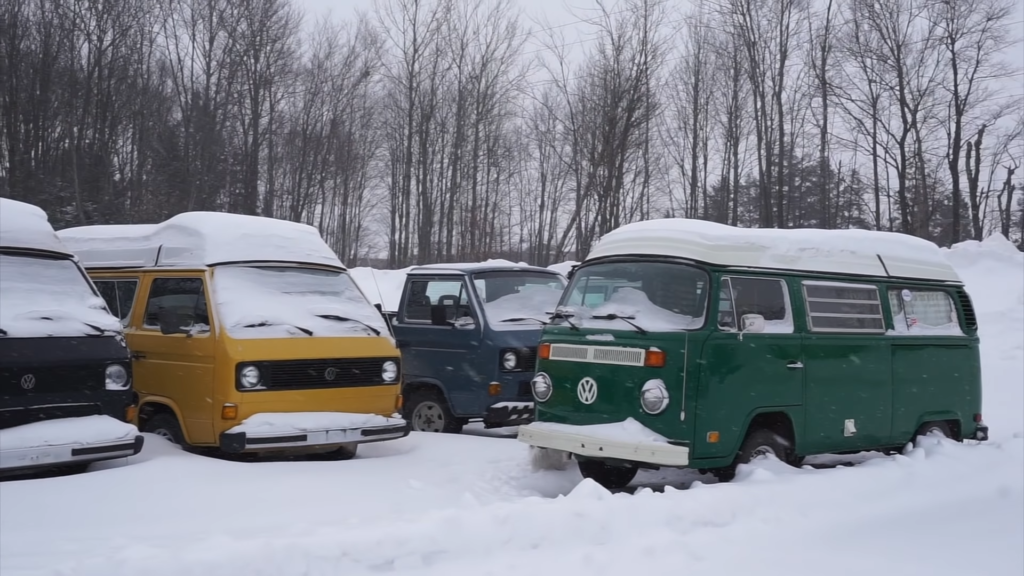
Can I Use My RV for Camping in the Winter?
The short answer is yes, but you’ll need to take some extra precautions. First, make sure your RV is properly insulated. You can do this by adding insulation to the walls and ceiling, as well as weather-stripping all of the doors and windows. You should also invest in a good heating system – a propane heater or electric space heater will do the trick
If you are going on a long journey, you should take with you a set of mandatory items, such as a tow rope, a pump, “lighting” wires, brake fluid, antifreeze, a set of tools, a shovel, a broom, a first aid kit, and the like.
It would be useful to stock up on a pack of salt, which can come in handy if the wheels of the trailer freeze to the ground during a long stop.
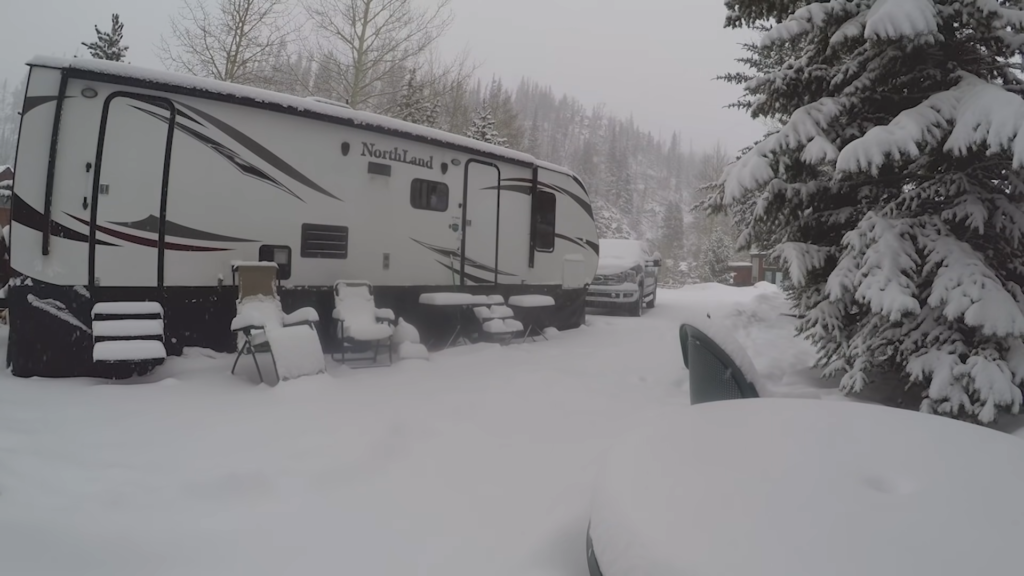
The camper should be parked at a slight incline to prevent ice build-up or water accumulation on the roof. This will allow water to drain freely. During long stops, it is recommended to periodically check the water supply and drainage systems, charge the battery and start the engine for a while. Such manipulations will protect you from possible troubles and delays on your next trip.
Of course, there are some things to keep in mind before setting off on a winter camping trip. First, check the weather forecast before you go – if it’s going to be extremely cold or snowy, it’s probably best to stay home. Second, make sure you have a plan for dealing with any potential emergencies.
Fill Your Fresh Water Tank and/or Use a Heated Water Hose
If you plan on living in your RV during the winter, one of the most important things you can do is to make sure your water supply is properly taken care of. First, fill up your fresh water tank before the cold weather hits. This will give you a reserve of water to use in case your pipes freeze or you can’t get to a water source. You should also invest in a heated water hose – this will prevent your water lines from freezing and ensure that you always have access to running water. With these measures in place, you’ll be able to stay comfortable and safe in your RV all winter long!
Fill Propane or Connect to an External Propane Tank
If you want to use your RV’s stove, oven, or heater during the winter, you’ll need to make sure you have a full tank of propane. You can either fill up your RV’s internal propane tank or connect to an external one – just make sure you do it before the cold weather hits. With a full tank of propane, you’ll be able to keep your RV warm and cozy all winter long! Additionally, you may want to invest in a propane-powered space heater. This can be a great way to supplement your RV’s heating system and keep things extra cozy.
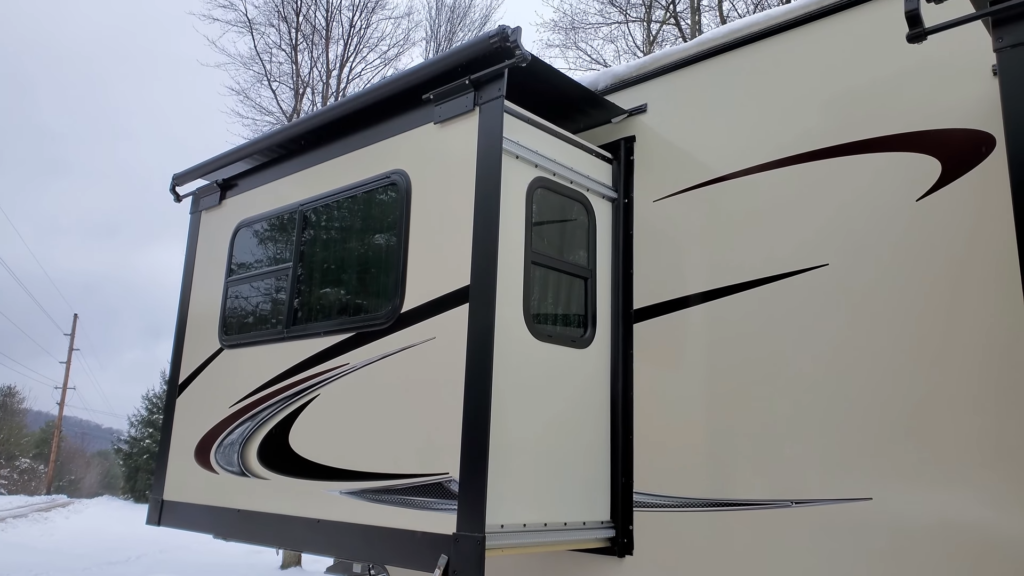
Keep Sewer Hose Off the Ground and Flowing Downward
If you plan on using your RV’s sewage system during the winter, there are a few things you need to keep in mind. First, make sure your sewer hose is off the ground – this will prevent it from freezing and becoming unusable. Second, always make sure the hose is flowing downward – this will help prevent any blockages or backups. With these measures in place, you’ll be able to use your RV’s sewage system with no problems all winter long!
Keep Gate Valves Closed and Insulated During Winter RV Living
This will prevent your RV from leaking heated air and will help keep it warm and cozy all winter long! Additionally, you may want to invest in some heavy-duty weatherstripping to seal any gaps around your slide-outs. With these measures in place, you’ll be able to enjoy your RV all winter long without any worries.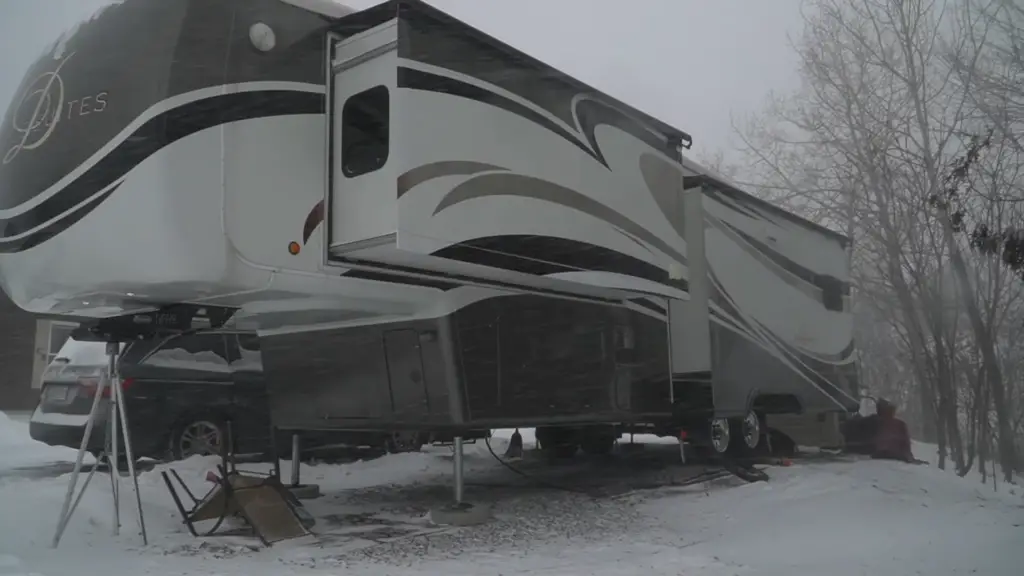
Run a 60-Watt Incandescent Light Bulb
If you want to prevent your RV’s storage compartments from freezing during the winter, there’s one simple solution: run a 60-watt incandescent light bulb in each compartment. This will generate enough heat to keep things from freezing, and you won’t have to worry about your belongings being damaged by the cold.
Just make sure you turn off the bulbs when you’re not using the compartments – otherwise, you’ll be wasting electricity!
Use a Remote Temperature Sensor
If you want to keep an eye on your RV’s temperature without having to go outside in the cold, invest in a remote temperature sensor. There are a variety of these sensors on the market, and they’re relatively inexpensive. With one of these sensors, you’ll be able to monitor your RV’s temperature from the comfort of your home – no more braving the cold to check the thermostat! Additionally, you can set up alerts so that you’ll be notified if the temperature inside your RV drops below a certain level. This way, you can take action immediately if there’s a problem with your heating system.
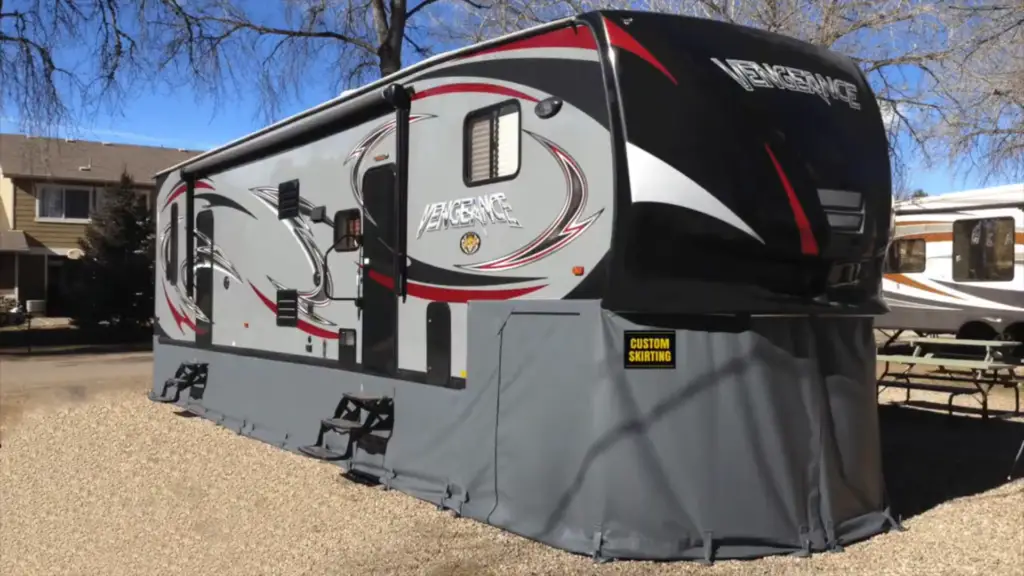
Cover AC Unit/Units
If you have an RV with central air conditioning, it’s important to cover the AC unit(s) during the winter months. This will prevent snow and ice from damaging the unit, and it will also help keep your RV warm. Just be sure to remove the cover(s) before you turn on the AC – otherwise, you could damage the unit! Additionally, you may want to invest in a heavy-duty tarp to cover your AC unit (or units). This will provide an extra layer of protection against the elements and can help prolong the life of your AC unit (or units). Plus, it’s always a good idea to have a tarp on hand in case of emergencies.
Driving Considerations
If you’re planning on driving your RV during the winter, there are a few things you need to keep in mind. First, make sure you have a good set of winter tires – this will help you stay safe on the roads. Second, it’s always best to give yourself extra time to get where you’re going so that you won’t have to worry about being late and can take your time if the weather is bad.
Correspondingly, here are a few winter driving tips to keep in mind:
- Always give yourself plenty of time to reach your destination. This way, you won’t have to rush and can take your time if conditions are bad.
- Be sure to pack a winter emergency kit. This will come in handy if you get stranded or run into trouble while on the road.
- Slow down and take your time when driving on ice or snow. Remember, it’s better to arrive late than not at all!
- If you start to slide, turn into the slide – this will help you regain control of your vehicle.
With these tips in mind, you’ll be able to safely drive your RV during the winter months. Just remember to take things slowly and be prepared for anything!
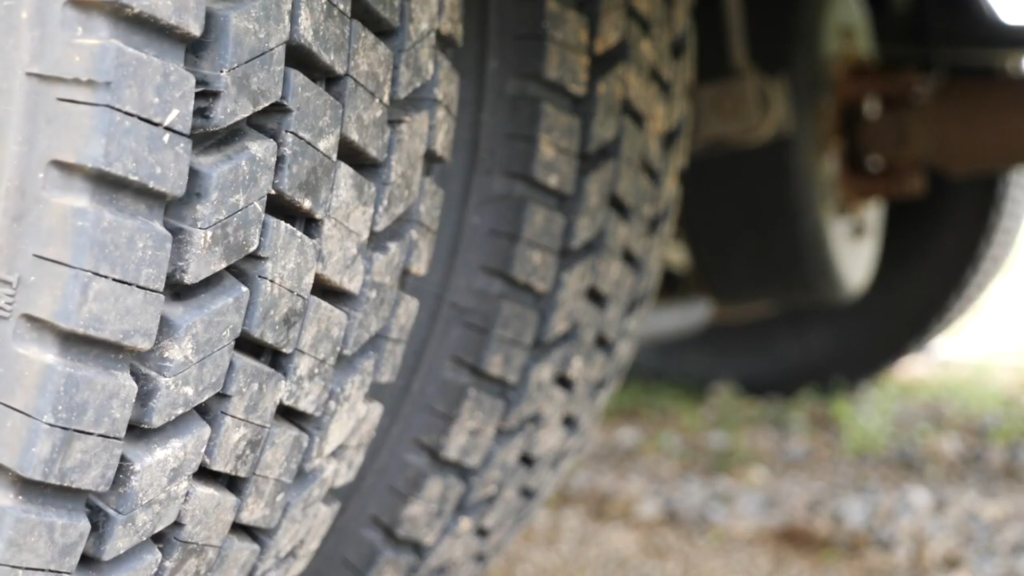
Other Essential Things To Pack
In addition to the items mentioned above, there are a few other things you’ll need to pack for your winter RV adventure. These include:
- A heavy-duty snow brush and ice scraper – This will come in handy for clearing snow and ice off your RV.
- A generator – This is essential for running heaters, lights, and other devices when there’s no power.
- Extra propane tanks – You’ll want to have plenty of propane on hand to keep your RV warm all winter long.
- Winter clothes and bedding – Be sure to pack plenty of warm clothes and blankets so you can stay comfortable all winter long.
- First-aid kit – It’s always a good idea to have a first-aid kit on hand, just in case.
- Emergency supplies – This includes food, water, and other essential items you might need in an emergency situation. [1]
Basic Tips for Living in Your Camper in the Winter
Now that you know what to pack for your winter RV adventure, here are a few basic tips to help you stay comfortable all season long:
- Dress in layers – This will help you stay warm, even if the temperature inside your RV drops.
- Use space heaters sparingly – Space heaters can be a great way to stay warm, but they can also be a fire hazard. Use them sparingly and always follow the manufacturer’s instructions.
- Keep the fridge and freezer stocked – Having plenty of food on hand will prevent you from having to go outside in the cold every time you need something.
- Invest in a good set of tires – Winter weather can be tough on tires, so it’s important to have a good set that can handle the conditions.
- Take it slow – Winter driving can be dangerous, so take your time and don’t take any unnecessary risks. [2]
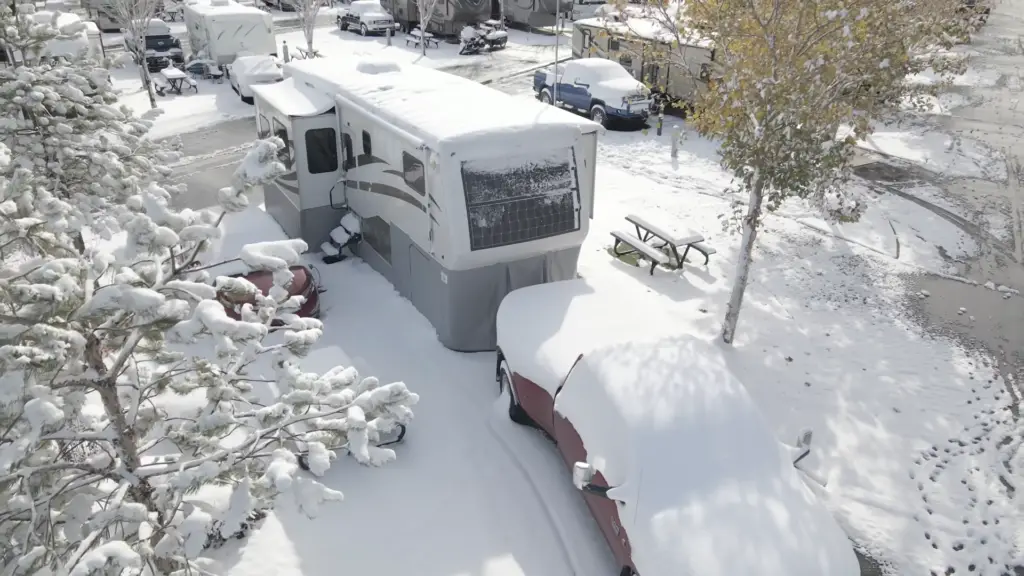
How to Keep a Trailer or RV Warm in Winter?
At sub-zero temperatures, gas consumption increases significantly. Therefore, you need to have a sufficient supply with you, designed for a certain period. Given that even with good insulation, the motorhome will have to be heated almost constantly, the life of one cylinder is significantly reduced and refueling may be required every 5 or 10 days, depending on the capacity.
Do not forget to check the remaining amount of gas from time to time so that its absence does not become an unpleasant surprise. When the cylinder can no longer be used for its intended purpose, condensate must be drained from it.
Now that you know what to pack and how to prepare your RV for winter, here are a few tips on how to keep it warm once the temperatures start to drop:
Just be sure to use them sparingly and follow all safety instructions.- Close off unused rooms – If you have an RV with multiple rooms, close off any that you’re not using. This will help conserve heat and save on energy costs.
- Insulate your RV -Adding insulation to your RV is a great way to keep it warm in the winter. You can find pre-cut insulation at most hardware stores, or you can make your own with bubble wrap and duct tape.
- Cover your windows – Windows are one of the biggest sources of heat loss in an RV. Be sure to cover them with curtains or blinds to help keep the heat in.
- Use a heavy-duty tarp – A tarp can provide an extra layer of insulation for your RV. Just be sure to secure it tightly so it doesn’t blow away in the wind.
In the heated space of the double floor of the motorhome, not only tanks with drinking, technical and waste water are placed, but also other communications, which can significantly save living space and not worry about the possibility of liquid freezing in the systems.
Double underfloor heating guarantees even distribution of heat over the entire area of the camper. And the air channels located along the walls ensure their heating and will avoid the formation of zones with a low temperature.
In the space under the floor, you can place a generator, air conditioning and a gas cylinder, as well as organize additional luggage compartments of various sizes there.
As you can see, you can live comfortably in a camper in winter. But for this he must be equipped and prepared accordingly. Modern manufacturers produce motorhomes already with everything you need, so you can operate them both in summer and in winter without restrictions. [3]
Things to Avoid at all Costs When Living in an RV in the Winter
Now that you know how to prepare your RV for winter and how to keep it warm, here are a few things to avoid at all costs:
- Don’t run the AC – The AC unit is one of the most vulnerable parts of an RV in the winter. Be sure to remove the cover (or covers) before you turn it on, otherwise you could damage the unit.
- Don’t use space heaters without ventilation – Space heaters can be a great way to stay warm, but they can also be a fire hazard. Always use them with proper ventilation and follow all safety instructions.
- Don’t leave food out – Food can attract pests in the winter, so be sure to keep it stored away in airtight containers.
- Don’t leave your RV unattended – If you’re going to be away from your RV for an extended period of time, be sure to disconnect the power and water lines. This will prevent your RV from freezing and bursting pipes.
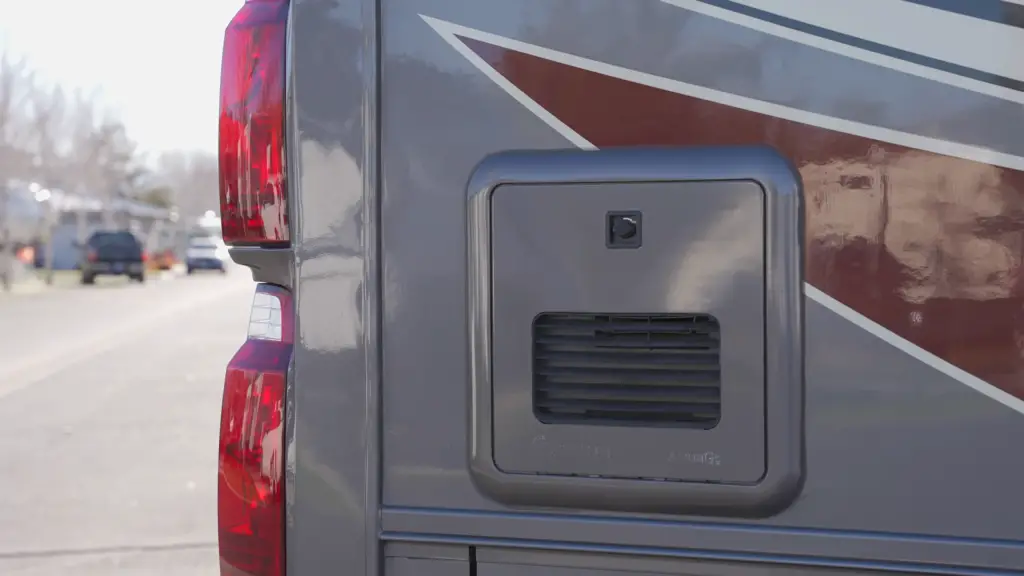
Living in an RV in the winter can be a great experience, as long as you’re prepared. Be sure to pack plenty of warm clothes and blankets, and follow these basic tips to help you stay comfortable all season long.
What to Look for When Buying an RV for Winter Travel
If you’re in the market for an RV to use for winter travel, here are a few things to keep in mind:
- Look for an RV with good insulation – This is one of the most important features to look for in an RV. Be sure to check the walls, floors, and ceilings for thick insulation.
- Look for an RV with a heater – A good heater is essential for staying warm in the winter. Be sure to check that the unit is in good working condition and that it’s been serviced recently.
- Look for an RV with skirting – Skirting is a good choice for winterizing your RV, since it keeps the cold out while also providing insulation. It can also help you prevent snow and ice damage. Use a heavy-duty skirting material.
- Look for an RV with a winter package -To make winter camping more comfortable, many RV manufacturers offer packages with features like heated holding tanks and extra insulation. Make sure you inquire about these choices when searching for an RV.
- Look for an RV with good tires – Winter weather can be tough on tires, so it’s important to have a good set that can handle the conditions. Be sure to check the tread depth and pressure of the tires before you buy. [4]
Pros and Cons of RV life
RV living has its pros and cons, like anything else. It’s important to weigh both sides before making a decision. Here are some things to consider:
Pros:
- You can take your home with you wherever you go – One of the best things about RV living is that you can take your home with you wherever you travel. This means that you never have to worry about finding housing when you’re on the road.
- You have more freedom and flexibility – Another great thing about RV living is that it gives you more freedom and flexibility than traditional living arrangements. You’re not tied down to one location, so you can easily pick up and move whenever you want.
- RVs are typically more affordable than traditional homes – RVs are usually cheaper than buying or renting a traditional home. This is because you don’t have to pay for things like property taxes, homeowners insurance, or utilities.
Cons:
- You have to downsize your belongings – One of the downsides of RV living is that you have to downsize your belongings. This is because there’s limited space in an RV. You’ll need to get rid of anything that you don’t absolutely need.
- RVs can be difficult to drive – Another downside of RV living is that RVs can be difficult to drive. They’re typically larger than a standard car, and they can be challenging to maneuver in tight spaces.
- If you’re not comfortable driving a large vehicle, then RV living may not be for you.
- RVs require more maintenance than traditional homes – RVs require more maintenance than traditional homes. This is because they have more moving parts and systems that need to be regularly serviced. If you don’t want to deal with the hassle of maintaining an RV, then it may not be the right choice for you.
RV living isn’t for everyone, but it can be a great way to travel and see the country. It’s important to do your research and weigh the pros and cons before making a decision. If you think RV living could be right for you, then go for it! There’s no better way to see the world than from the comfort of your own home on wheels. [5]
FAQ
What is the best RV cover for winter?
There are a few things to look for in a good RV cover:
- A heavy-duty tarp – A tarp can provide an extra layer of insulation for your RV. Just be sure to secure it tightly so it doesn’t blow away in the wind.
- An RV cover with a skirt – A skirt helps to insulate your RV and can also provide some protection from snow and ice. Be sure to check that the skirting is made from a heavy-duty material.
- An RV cover with a winter package – Many RV manufacturers offer winter packages that include features like heated holding tanks and extra insulation. Be sure to ask about these options when you’re shopping for an RV.
A camper needs proper winterization just like any other vehicle. First of all, you need to pay attention to the technical condition of the motorhome and eliminate even minor malfunctions, if any.
It is imperative to fully charge the battery, replace the spark plugs, and also pay attention to the door locks and drop a little oil into them, which will prevent the condensate from freezing. [6]
Do RV prices drop in the winter?
RV prices tend to be lower in the winter, so it’s a great time to buy if you’re looking for a deal. However, you may have difficulty finding an RV that’s fully stocked and ready to go during the winter months. It’s important to keep this in mind when shopping for an RV during the winter. You may need to order some items separately or wait until spring to get your new RV on the road.
Living in an RV can be a great way to travel and see the country. It’s important to be prepared though, especially if you plan on living in your RV during the winter months. Warm clothes and blankets are essential for a comfortable winter, so be sure to pack plenty. These basic tips will help you stay cozy all season long. You can enjoy your winter RV trip without issue if you plan ahead of time.
Is it legal to live in an RV full time?
The answer to this question depends on where you plan on living in your RV. In most cases, it’s perfectly legal to live in an RV full time as long as you’re not parked in one spot for more than a few months. However, there are some areas that have restrictions on how long you can stay in an RV or how often you need to move it.
If you have to leave the vehicle for a long time, it is worth remembering that during this period it will not be heated. Therefore, it is necessary to first drain all the water from the communications. For this, special cranes are provided. To perform this event, you need to turn on the pump, open all the taps, not forgetting the boiler, and wait until the water has completely drained. If this procedure is not performed, the consequences of freezing communications will be very deplorable, and repairs will be expensive. [7]
Do RVs have a fireplace for winter?
RVs don’t typically have a fireplace, but there are a few ways to create a cozy space in your RV for winter. One option is to use a portable electric fireplace. These units can be plugged into any standard outlet and provide heat without the need for a chimney. Another option is to use a space heater.
With a little preparation, you can enjoy your winter RV adventure without any problems. Just be sure to pack plenty of warm clothes and blankets, and follow these basic tips to help you stay comfortable all season long. With the right gear and some careful planning, you can make the most of your winter RV experience. [8]
What do you need to be prepared for in advance?
A car breakdown is the main force majeure on the road. If something goes wrong and the motorhome gets up in the middle of a country road in the mountains, then you need to be ready for repairs.
Another important risk to consider is disease. Gather a first aid kit in advance and find out how to contact doctors in case of emergency, even far from populated areas.
Useful Video: How to Survive a Canadian Winter in an RV
Conclusion
Winter RVing can be a great way to travel and see the country, but it does come with some challenges. By understanding what to expect and planning ahead, you can make your winter RVing experience a great one. Have you ever tried RVing in the winter? What tips would you add?
References
- https://www.entegracoach.com/connection/14-items-to-pack-for-winter-rv-trip/
- https://www.blackseries.net/blog/living-in-rv-travel-trailer-during-winter.html
- https://rvshare.com/blog/rv-in-the-winter/
- https://www.pop-up-campers-trailer.com/buyers-guide-to-winter-travel-trailer-campers.html
- https://thehomethatroams.com/blog/pros-and-cons-of-rv-living/
- https://camperreport.com/best-rv-cover-for-snow/
- https://offgridpermaculture.com/Finding_Land/How_to_Live_in_an_RV_on_Your_Own_Land_Legally.html
- https://vehq.com/fireplace-travel-trailer/

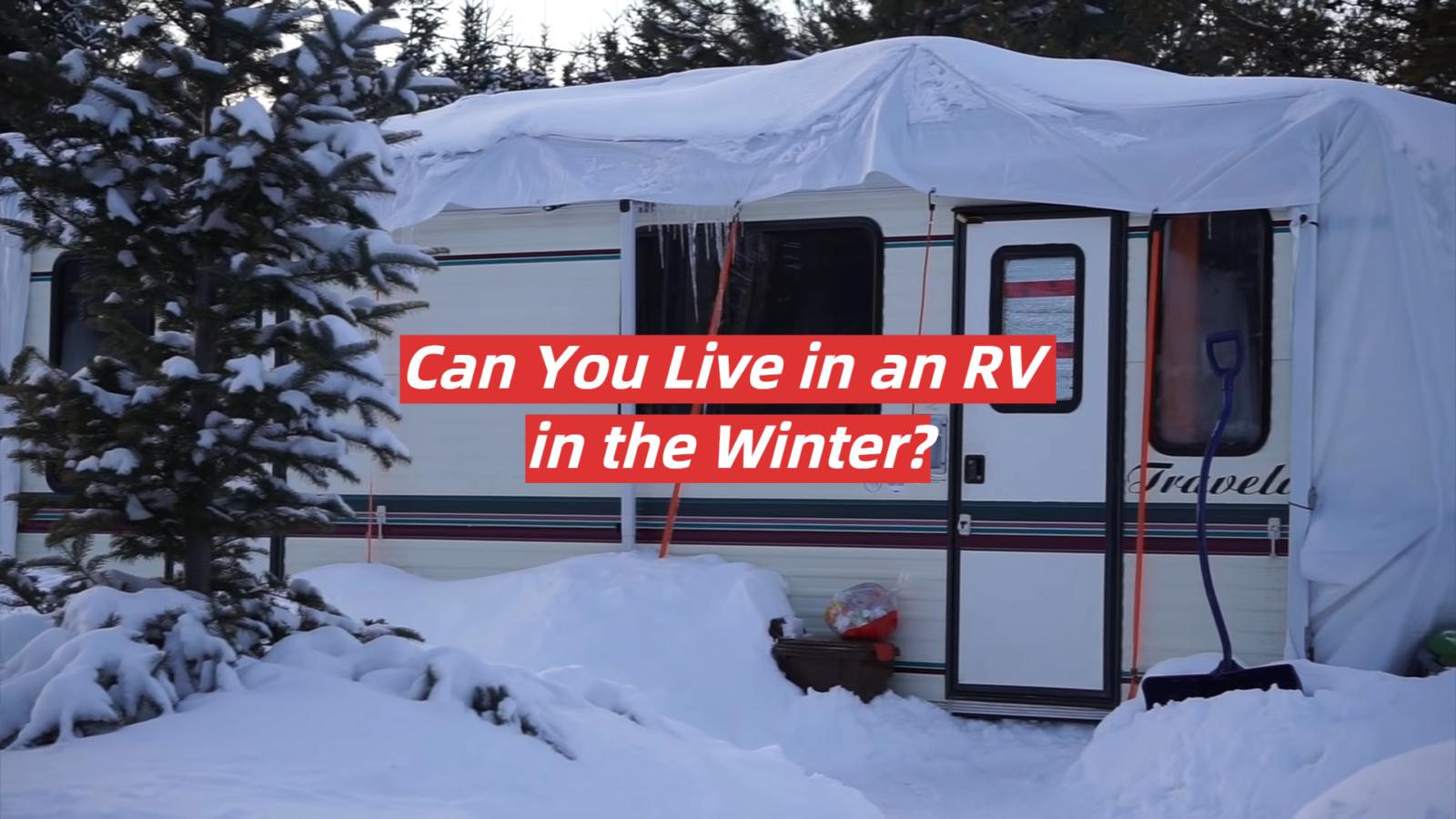

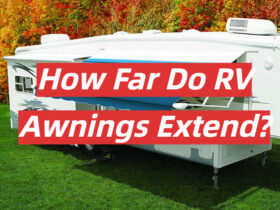

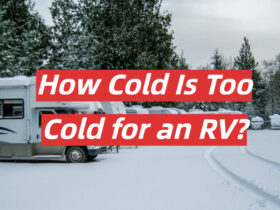
Leave a Reply